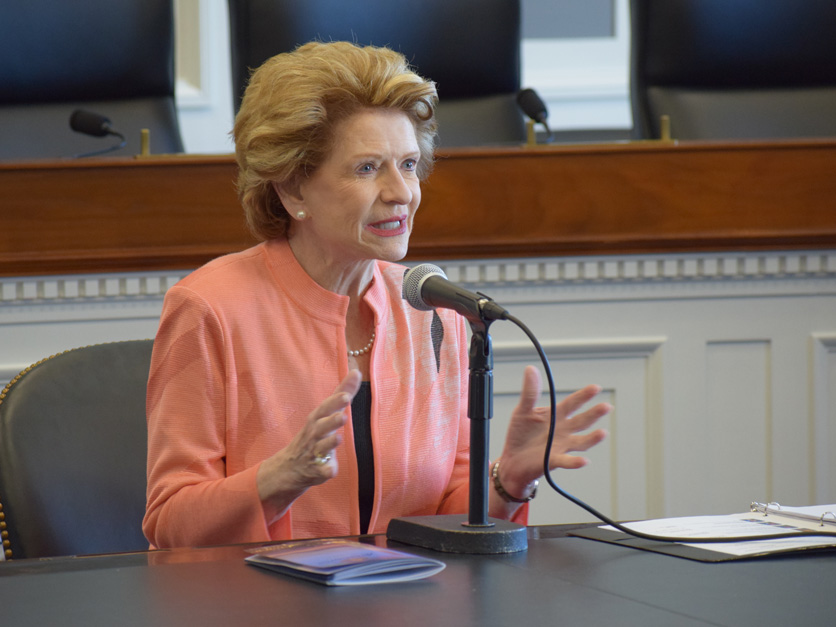House Agriculture Committee Chairman Glenn Thompson is leaving the door open to trying to tighten SNAP eligibility rules through the farm bill if Republicans fail to get a debt-limit deal with President Joe Biden to expand the program’s work requirements.
“I have the trust of (House Speaker Kevin McCarthy, R-Calif.) to continue to do the best possible job I can with leading this farm bill discussion to get us to where we need to be,” Thompson, R-Pa., told members of the North American Agricultural Journalists on Tuesday.
“I'm supportive of the things that were put into the debt ceiling (bill),” he said, but noted his “preference would have been to just work on this during the farm bill.”
Meanwhile, his Senate counterpart, Senate Ag Chairwoman Debbie Stabenow, D-Mich., indicated Tuesday she may resist repurposing any of the Inflation Reduction Act funding for farm bill programs, not just the bill’s funding increase for farm bill conservation programs.
The bill provided about $19 billion for forestry and energy programs in addition to the conservation funding.
“These (IRA) dollars are going for purposes that support farmers. They go to farmers, they go to ranchers, they go to foresters, and people are counting on those dollars,” she told the ag journalists in a separate meeting.
Stabenow noted that rural electric cooperatives would be major beneficiaries of the $14 billion in IRA funding for rural energy programs.
“I don’t think they would appreciate having that taken away at this point, as they know the USDA is moving forward to create contracts moving forward with those dollars,” Stabenow said.
House Republicans are preparing to vote in the coming days on a bill — the Limit, Save Grow Act — that would cut $4.8 trillion in future spending, according to the Congressional Budget Office, in exchange for increasing the federal debt ceiling. The bill includes provisions to raise the age for SNAP work requirements from 49 to 55 and also would repeal a series of IRA tax incentives for biofuels, including an extension of the $1-per-gallon tax credit for biodiesel.
The expanded SNAP work rules would cut the program’s cost by $11 billion over 10 years, CBO noted.
The top Republican on the Senate Ag Committee, John Boozman of Arkansas, said he thought the SNAP work rules would be a major subject of negotiations between Biden and House Republicans.
“I think the reality is that that will be worked out, or fought, during that process,” Boozman said.
 Senate Ag Chair Debbie Stabenow, D-Mich.
Senate Ag Chair Debbie Stabenow, D-Mich.Boozman also reiterated his stance that the next farm bill must raise reference prices in the Price Loss Coverage program. The 2018 farm bill allowed the reference prices to rise during periods of strong commodity markets, but the increase is capped at 15% above the statutory rates.
“We’ve got to get them up to date or I’m not voting for the farm bill,” Boozman said of the reference prices.
Don’t miss a beat! It’s easy to sign up for a FREE month of Agri-Pulse news! For the latest on what’s happening in Washington, D.C. and around the country in agriculture, just click here.
Stabenow didn't commit to supporting increases. “This is part of our negotiations,” she said, noting that there were varying farm concerns depending on the commodity and region.
She said Boozman “is looking through the lens of rice and other southern crops and we want to address issues to make sure that that we have a strong safety net.”
Neither Thompson nor Stabenow indicated when their committees would act on a new farm bill.
“Chairman Thompson and I both have sort of a friendly competitiveness about who will get their farm bill passed first,” Stabenow said, stressing that the process could take “several months yet.”
The committees can’t really get started until the May 12 CBO rollout of updated cost forecasts for existing programs. That baseline is used by CBO to estimate the cost of any changes in a new farm bill, including increases in reference prices.
Thompson didn’t rule out negotiating some provisions of the bill with his Senate counterparts before the respective committees move their versions of the legislation.
“We'll see if that occurs. I think part of that is good communications and relationships, and we've been working hard to foster both of those,” Thompson said. “Hopefully, it pays dividends.”
The committees are continuing to hold hearings on the farm bill. A House Ag subcommittee scheduled a hearing Wednesday with representatives from 10 different commodity groups. The Senate Ag Committee will hold a pair of hearings next week on commodity programs and crop insurance.
For more news go to Agri-Pulse.com.


